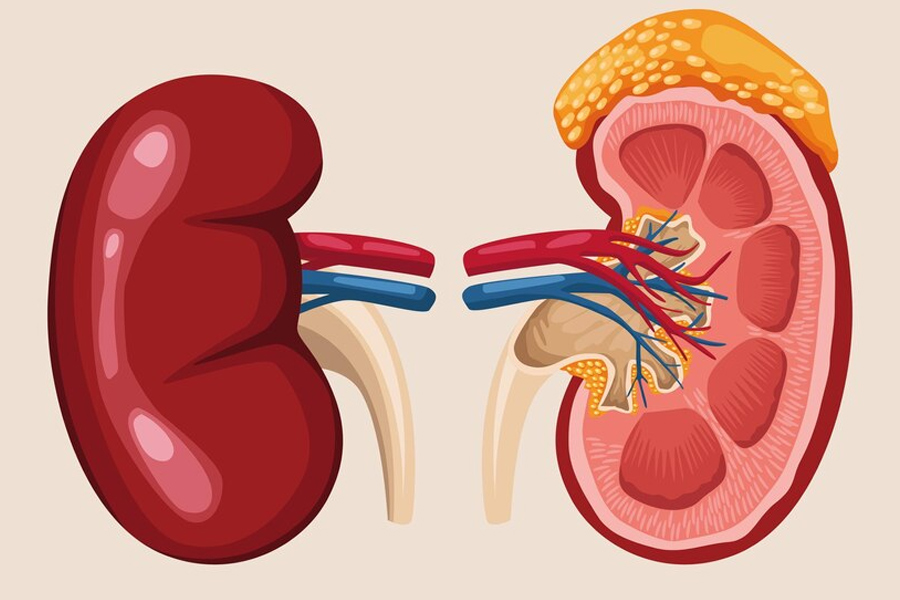
Diabetes, a persistent condition marked by the body's inability to regulate blood sugar levels, has become a significant global health issue. A substantial portion of the population is affected by this ailment, and concerning data indicates a rising incidence of diabetes, particularly among youths and adolescents. However, did you know this diabetes is a major risk factor for kidney diseases? High blood sugar levels can damage the blood vessels in the kidneys, leading to kidney damage and eventually kidney failure. We spoke to Dr Mukesh Batra, Founder and Chairman, Dr Batra's Healthcare, and Padmashree recipient, who explained the connection between diabetes and kidney diseases.
Table of Content:-

As per the findings reported in the Indian Journal of Ophthalmology, the diabetic population in India numbered 77 million individuals in 2019, with projections indicating an increase to over 134 million by 2045. Alarmingly, 57% of these cases go undiagnosed. By the year 2035, it is estimated that diabetes will contribute to the loss of approximately 592 million lives worldwide.
Connection Between Diabetes and Kidney Disease

According to the National Kidney Foundation, kidney failure eventually affects 10-40% of people with Type 2 diabetes (adult onset) and about 30% of children with Type 1 diabetes (juvenile onset). Dr Batra listed the connection between diabetes and kidney diseases as follows:
- The blood vessels within the kidneys that are responsible for filtration, comprise tiny vessels.
- Prolonged high blood sugar levels can lead to narrowing and blockage of these vessels. Consequently, insufficient blood supply damages the kidneys, allowing albumin, a protein, to pass through the filters and into the urine where it should not be.
- Diabetes also has the potential to harm the nerves throughout the body, including those involved in bladder function.
"Nerves facilitate communication between the brain and various body parts, signalling when the bladder is full. However, diabetic nerve damage can disrupt this signalling, resulting in an inability to perceive bladder fullness. Consequently, pressure from an overly full bladder can inflict damage on the kidneys", added Dr Batra.
Additionally, prolonged retention of urine within the bladder due to impaired bladder function can increase the risk of urinary tract infections. Elevated sugar levels in urine create a favourable environment for bacteria growth, leading to infections primarily affecting the bladder but occasionally spreading to the kidneys.
Homoeopathic Treatment For Managing Diabetes
Combining homoeopathic medicine with hypoglycemic drugs and insulin presents a holistic approach to managing diabetes. Dr Batra said, "Administering homoeopathic remedies alongside conventional treatments can aid in stabilising insulin levels, potentially leading to a gradual reduction and eventual cessation of traditional anti-diabetic medications. "
Dr Batra highlighted a recent study conducted in Athens that showcased promising outcomes from the synergistic use of Homoeopathic treatment. The study involved dividing a group of type 2 diabetes patients into two groups: one receiving standard oral anti-diabetic drugs with a placebo, and the other receiving the same drugs supplemented with Homeoopathy.
He added, "Over nine months, Group 1 exhibited a 47% improvement, whereas Group 2, receiving both conventional medication and Homoeopathic treatment, showed a remarkable 97% enhancement in diabetes management."
"Homoeopathic remedies, such as Homoeopathic Insulin can contribute to maintaining healthy blood sugar levels and preventing sugar in the urine. Abroma Augusta is known as an effective natural homoeopathic remedy for diabetes mellitus. On the other hand, phosphorus helps in treating vision weakness", added Dr Batra.
Lifestyle Tips To Follow

Here are some lifestyle habits that you should adopt to maintain a balanced diabetes level, as listed by the expert:
- Steer clear of processed and unhealthy foods that are packed with sugar.
- Opt for high-fibre whole foods, such as oats, fruits, vegetables (like bitter gourd), and seeds with a low glycemic index.
- Integrate consistent physical activity into your routine, such as a daily 30-minute walk, to support weight management.
- Quit smoking entirely or reduce alcohol intake to a minimum.
[Disclaimer: This article contains information provided by an expert and is for informational purposes only. Hence, we advise you to consult your expert if you are dealing with any health issues to get the necessary treatment.]
Also watch this video
How we keep this article up to date:
We work with experts and keep a close eye on the latest in health and wellness. Whenever there is a new research or helpful information, we update our articles with accurate and useful advice.
Current Version